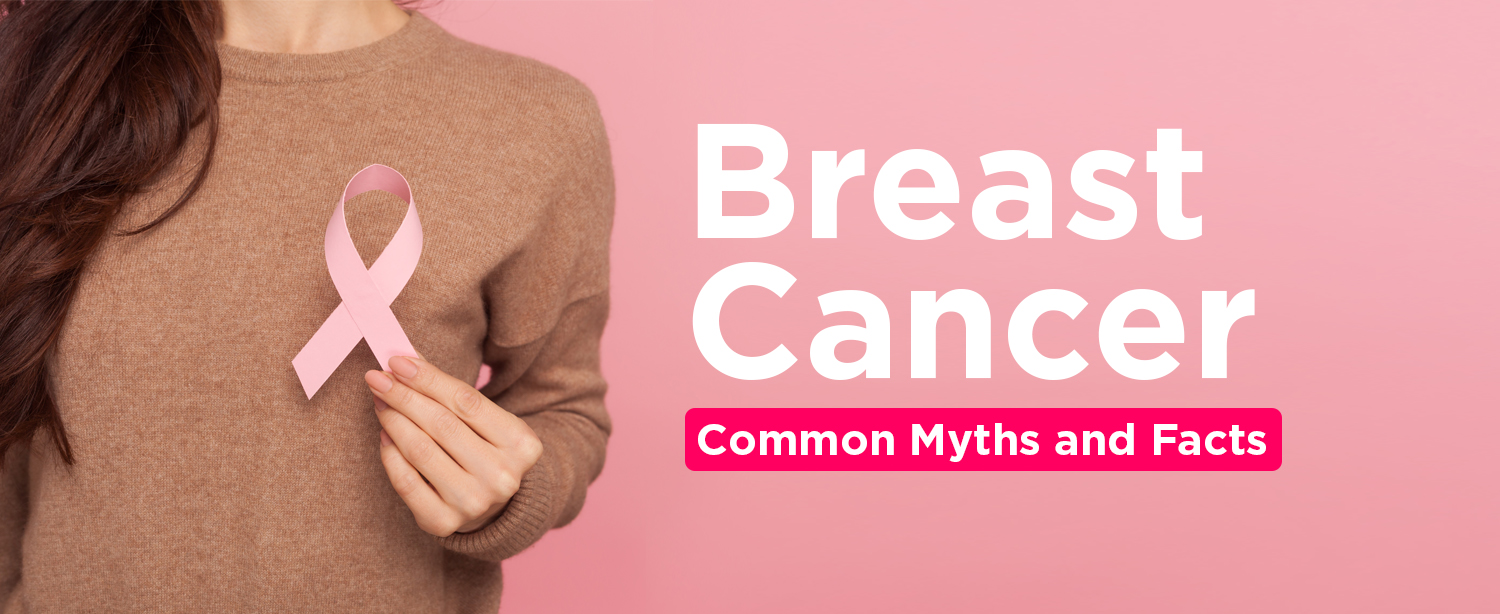Breast cancer is the most common type of cancer in women and accounts for 14% of cancers in Indian women. Statistics suggest that this cancer is on the rise, both in rural and urban India and every four minutes, an Indian woman is diagnosed with breast cancer. In 2018 there were 1,62,468 new registered cases and 87,090 reported deaths by breast cancer in India.
In India, the lifetime risk of developing breast cancer is one in twenty-eight women. Higher stages of cancer growth make survival more challenging, and stage 3 and stage 4 breast cancer affect more than 50% of Indian women. Women in India have a low survival rate for breast cancer due to a lack of knowledge and inadequate rates of early detection and diagnosis. Let us understand more about the Myths & Facts surrounding breast cancer in this article.
What is Breast Cancer?
Breast cancer is a condition in which cells start to grow out of control, frequently developing a lump that is obvious upon physical examination. Depending on the kind of breast cells that are harmed, there are many types of breast cancer. One of the most common, invasive ductal carcinoma, relates to cells that grow outside the breast ducts. Depending on the stage of the cancer, each breast cancer case is treated differently.
Common Myths and Facts
Unfortunately, there are a number of breast cancer myths that are completely false. Here, we dispel some widespread misconceptions and presumptions about breast cancer:
Myth: Breast Cancer is always hereditary
Fact: The majority of women who are diagnosed with breast cancer, in reality, do not have any known familial ties. Only 5 to 10% of cases are genetically related. Even though there is a family history of breast cancer, it does not guarantee that a specific person will contract the illness.
Myths: Mammograms are unsafe and painful
Fact: Modern technology means that radiation levels are minimal and safe. The level of discomfort is minimized by modern mammography technology. Women may choose to schedule a mammogram at a different time because their breasts may be sensitive right before or right after menstruation.
Myth: Breast Cancer doesn’t develop in healthy individuals
Fact: People who are fit and live very healthy lifestyles can still develop cancer. Being overweight and eating poorly do raise the risk of developing breast cancer, and taking care of one’s health and keeping a healthy weight improves one’s chances but does not completely eliminate the danger.
Myth: Excess sugar intake can cause Breast Cancer
Fact: Sugar and cancer does not have a direct link. However, a diet high in sugar typically causes weight gain and raises the chance of acquiring a number of malignancies that also include cancer. For a variety of health reasons, people should cut back on processed sugar in their diets, although there is currently insufficient proof that it directly contributes to breast cancer.
Myth: A lump is always a symptom of Breast Cancer
Fact: Breast cancer doesn’t always cause a lump and a lump does not always indicate that a person has the condition. Regular screenings are thus crucial to detect breast cancer. You must consult a doctor if you see something is unusual with your breast.
Myth: Young women do not get Breast Cancer
Fact: Breast cancer is more likely to occur in a woman older than 35, however it can also occur in very young women. Any lump found at any age needs a thorough medical checkup by a doctor.
Myth: Breast cancer is not painful
Fact: Breast cancer is usually not associated with pain, however some women suffering from breast cancer do experience pain as a symptom. A doctor must thoroughly examine any breast pain.
Myth: Redness, pain or bloody discharge are only signs of mastitis
Fact: Mastitis is a common condition in young mothers, but if the symptoms persist despite receiving antibiotic treatment, the patient should undergo additional testing. Young women with breast cancer may experience similar symptoms to those of mastitis.
Breast Cancer care at Kokilaben Dhirubhai Ambani Hospital
The Comprehensive Breast Care Unit at our Centre for Cancer is a dedicated service that has been created to specifically diagnose and treat conditions affecting the mammary gland. The unit is designed on the guidelines laid down by the European Union Society of Mastology (EUSOMA). Our experienced oncologists offer personalized care using the most advanced technology and high quality expertise. Our team has successfully performed over 3300 breast cancer surgeries. Please find the below link for further details: https://www.kokilabenhospital.com/departments/centresofexcellence/centrefor_cancer/comprehensivebreastcareunit.html


